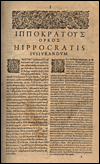19 Greek Medicine – The Hippocratic Oath
The Hippocratic Oath
This oath, the oldest and best-known expression of a medical ethic, was for centuries regarded as the guide for proper medical conduct. Although the accomplishments of modern medicine appear to have taken the discipline far from its ancient roots, the oath continues to offer a powerful account of what it means to be a doctor.
The oath begins by invoking ancient Greek deities. The specific deities invoked are Apollo (here, “Apollo Physician”), the god associated with light, truth and prophecy; Asclepius, child of Apollo, the “father” of medicine, Hygieia, (whose name means “health,” “living well”) and Panaceia (“all heal”), both daughters of Asclepius and associated with what modern readers might call “prevention” and “treatment.” The oath concludes with a plea, acknowledging that the physician’s fortunes depend on his fulfillment of its terms.
The six substantive paragraphs in between address first (in the oath’s longest paragraph) how the physician should comport himself with respect to his teachers, as well as his teacher’s offspring, his own, and all other students of medicine. Physicians are here, literally, called into fraternity with one another; the gift of the medical art is equated with the gift of life. The five subsequent paragraphs indicate how the physician should conduct himself with respect to his patients and their households. The first three deal with the ends and means of treatment, appropriate and inappropriate, the last two with decorum. – Leon Kass
The Hippocratic Oath (Ορκος) is perhaps the most widely known of Greek medical texts. It requires a new physician to swear upon a number of healing gods that he will uphold a number of professional ethical standards. It also strongly binds the student to his teacher and the greater community of physicians with responsibilities similar to that of a family member. In fact, the creation of the Oath may have marked the early stages of medical training to those outside the first families of Hippocratic medicine, the Asclepiads of Kos, by requiring strict loyalty.
Over the centuries, it has been rewritten often in order to suit the values of different cultures influenced by Greek medicine. Contrary to popular belief, the Hippocratic Oath is not required by most modern medical schools, although some have adopted modern versions that suit many in the profession in the 21st century. It also does not explicitly contain the phrase, “First, do no harm,” which is commonly attributed to it.
The Hippocratic Oath
I swear by Apollo the physician, and Asclepius, and Hygieia and Panacea and all the gods and goddesses as my witnesses, that, according to my ability and judgement, I will keep this Oath and this contract:
To hold him who taught me this art equally dear to me as my parents, to be a partner in life with him, and to fulfill his needs when required; to look upon his offspring as equals to my own siblings, and to teach them this art, if they shall wish to learn it, without fee or contract; and that by the set rules, lectures, and every other mode of instruction, I will impart a knowledge of the art to my own sons, and those of my teachers, and to students bound by this contract and having sworn this Oath to the law of medicine, but to no others.
I will use those dietary regimens which will benefit my patients according to my greatest ability and judgement, and I will do no harm or injustice to them.
I will not give a lethal drug to anyone if I am asked, nor will I advise such a plan; and similarly I will not give a woman a pessary to cause an abortion.
In purity and according to divine law will I carry out my life and my art.
I will not use the knife, even upon those suffering from stones, but I will leave this to those who are trained in this craft.
Into whatever homes I go, I will enter them for the benefit of the sick, avoiding any voluntary act of impropriety or corruption, including the seduction of women or men, whether they are free men or slaves.
Whatever I see or hear in the lives of my patients, whether in connection with my professional practice or not, which ought not to be spoken of outside, I will keep secret, as considering all such things to be private.
So long as I maintain this Oath faithfully and without corruption, may it be granted to me to partake of life fully and the practice of my art, gaining the respect of all men for all time. However, should I transgress this Oath and violate it, may the opposite be my fate.
Translated by Michael North, National Library of Medicine, 2002.
- Why begin the oath with an invocation of the gods? Why these gods? What does the beginning suggest about the powers of the physician and their source?
- Parents, rightly, often resent the authority teachers have over their children. Yet, here, physician-teachers are explicitly equated with fathers, medical students with their sons. Is this equation or analogy justifiable? Why or why not?
- What attitude toward the medical arts is expressed in the oath’s five paragraphs on ends, means, and conduct towards patients and families?
- What, according to the oath, is the true purpose of medicine?
- Can you explain and justify the limits the oath places upon the uses of medical technique?
- Except to say that the doctor must neither kill nor suggest killing, the oath is silent on the subject of death. What can one infer from the oath about a doctor’s obligations to the hopelessly ill?


